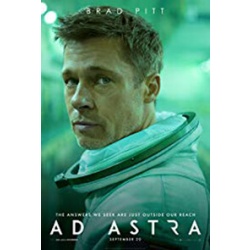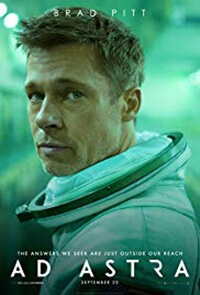
MOVIE REVIEW: The new Brad Pitt movie is a brilliant, brooding sci-fi journey worth taking
(by decorahnews.com's Ben Gardner):
In broad outline, the new film "Ad Astra," starring Brad Pitt, is a sci-fi reworking of "Apocalypse Now," with Pitt portraying a version of Martin Sheen's character, and Tommy Lee Jones adopting the deranged gravitas of Marlon Brando's rebellious Colonel Kurtz. "Ad Astra" has a bad-dad plot twist that ups the stakes for Pitt's character: Pitt is recruited by the military to help locate his father (Jones), whose space ship disappeared thirty years ago while searching for intelligent life. Echoing the 1972 art house sci-fi classic "Solaris," mysterious energy pulses are emanating from Neptune, where Jones' character is thought to still be living. Roy agrees to search for his father, and the film begins as an episodic journey through space.
But soon, the brokenness of Pitt's character is slowly revealed—by flashbacks to a failed relationship with a character played by Liv Tyler and aided by an intimate voice-over from Pitt, reminiscent of Sheen's measured narration in "Apocalypse Now." The script, co-written by director John Gray and Ethan Gross, offers actress Liv Tyler nothing to work with and it's a missed opportunity and flaw of an otherwise breathtaking and epic introspective film.
The filmmakers use the well-trod storytelling device of father-son conflict to increase the personal stakes for Pitt's solemn, stoical character. But ultimately, the film is a journey, both to the bounds of space, as well as the frontier of the self. And it is this inward journey—conveyed with solemn gravitas from Pitt—that propels the story beyond a clichéd attempt at father-son reconciliation.
John Gray, the co-writer and director of the film, is an accomplished filmmaker who typically makes thoughtful, accessible, and brooding films about men caught between the demands of personal and professional life. "Ad Astra" is similarly in conversation with public and private life, represented in Pitt's failure at vulnerability and his compulsion to journey to the bounds of space to seek a remedy for his existential problems.
Over the last few years, Pitt is having a renaissance. After a public divorce and recovery from alcoholism, he has put more effort into his production company Plan B (Pitt is one of the producers of "Ad Astra") and he's recently received critical acclaim for "Ad Astra," as well as the new Quentin Tarantino film, "Once Upon a Time…in Hollywood," released in the summer.
I'm not always a fan of Pitt. He has strengths and weakness. His strengths are what have made him a leading man for nearly 30 years: his looks, charm, and intimate stoical presence. His weaknesses: delivering dialogue. He's much better when filmmakers emphasize his quietude and solemn presence ("Ocean's Eleven," "Tree of Life," "Once Upon a Time in…Hollywood," "Ad Astra"), rather than extolling wordy dialogue ("Inglorious Basterds," "Interview with the Vampire," "War Machine").
In this respect, he owes much to the classic U.S. leading man archetype, most notably represented by Humphrey Bogart and Robert Redford. Redford is the clearest influence on Pitt, trivially because they look similar, but more importantly because Redford, like Pitt, is best when the camera lingers quietly on the furrowed contours of his familiar face. It isn't simply that these gentlemen are preternaturally good-looking; they're movie stars because, from the moment both actors made their screen debuts, audiences have trusted them. There's something in the warm intimacy in their eyes that makes a wide demographic of audiences trust these strangers to tug at our heart strings.
Similar to "Apocalypse Now," "Ad Astra" is peopled with a collage of charismatic supporting performances, including Tommy Lee Jones, Ruth Negga, and Donald Sutherland. Both Jones and Sutherland have had storied careers and when each appeared on screen, I was reminded of how charismatic and familiar those two faces are, and how I'd love to see them in more movies. (Let's put a cap on how many movies Michael Caine and Morgan Freeman can be in annually; their performances recently have been tired and there are plenty of quality aging A-list actors looking for work in a movie industry increasingly congested by franchises.)
"Ad Astra" owes much to Francis Ford Coppola's "Apocalypse Now," and Jones' performance is similar in many ways to Marlon Brando's turn as the unhinged Colonel Kurtz. Jones, similar to Brando, has to be both sympathetic and dangerous. His possibly maniacal space program is the impetus for Pitt's journey, and the mystery surrounding his father's character and work compels much of the wonder and suspense of Pitt's ruminative, episodic journey through space.
I say "episodic" because "Ad Astra" owes much to the journey-narrative, illustrated by novels like, "The Underground Railroad," "Huckleberry Finn," "Tom Jones," and "Don Quixote." Joseph Conrad's novella "Heart of Darkness"—upon which the film "Apocalypse Now" is based—is also part of this tradition, and the influence of "Apocalypse Now" on "Ad Astra" is both profound and artfully executed. Pitt's intimate introspective narrative, the charismatic supporting performances, the brokenness of Pitt's character, and his gradual disillusionment and eventual cathartic understanding—all of these owe a debt to Coppola's "Apocalypse Now.
In the end, this reflective existential journey is a story of letting go, and in this way, this slow-burn existential space odyssey has an optimistic and timely commentary on conversations about toxic masculinity. The heart of the film is tethered to Pitt's soulful performance and it's his inward journey, rather than the mystery of extraterrestrial life, that makes this film an existential journey worth taking.
"Ad Astra" is rated MPAA PG-13 for some violence and bloody images, and for brief strong language.
It is currently playing at Fridley Theater in Decorah.
Site designed and maintained by Iroc Web Design Services©.
Your Small Business Web Design Solutions.™


